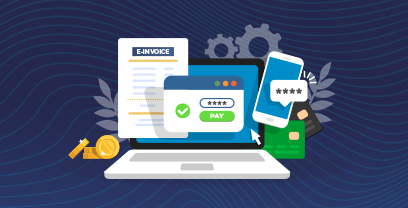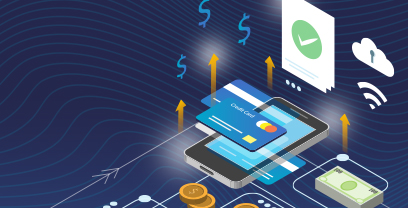Electronic invoicing, also known as e-invoicing is revolutionizing business operations by allowing companies to send and receive invoices digitally, facilitating faster processing, cost reduction, and greater compliance with regulatory demands. This digital transformation not only streamlines billing processes but also provides real-time financial insights crucial for decision-making.
And, as governments around the world tighten regulations to improve economic transparency, the adoption of e-invoicing is rapidly increasing. Globally, the e-invoicing market reached $13.5 billion in 2023 and is projected to hit $60.9 billion by 2032, indicating a compound annual growth rate of 17.7% from 2024 to 2032.
In this article, we will discuss e-invoicing, including what it is–why it matters, account payables automation, supplier portals and Government Gateways that ensure seamless invoice exchange while meeting diverse regulatory requirements.
What Is e-invoicing?
Electronic invoicing, or e-invoicing, is a process that allows businesses to automate the exchange and processing of invoices between suppliers and buyers, replacing traditional paper-based methods. This system functions within procurement operations as a key component of Accounts Payable (AP) Automation.
E-invoicing streamlines the procurement process by enabling faster invoice processing, reducing errors, and ensuring compliance with tax regulations. It facilitates more efficient transactional workflows and provides better visibility into financial transactions, thus improving cash flow management and helping businesses to capitalize on early payment discounts and avoid late fees.
The adoption of electronic invoicing (e-invoicing) is increasing globally, driven by its efficiency and cost-saving benefits. According to a 2018 E&Y survey, there are already regulations in place across more than 55 countries worldwide related to electronic invoicing. However, surprisingly, Ardent Partners “2023 ePayables Technology Advisor” report states that 55% of invoices are still being processed manually, mostly in North America, and AP staff spends almost a quarter of their time processing invoices.
How does e-invoicing Work?
E-invoicing significantly streamlines procurement operations by enhancing supplier collaboration, speeding up payment processes, and ensuring compliance and efficiency. It improves communication by providing a transparent platform for exchanging invoices and tracking payments in real-time, which helps quickly resolve disputes and strengthen relationships. Automating the invoicing process reduces payment cycle times, while systems automatically match invoices to purchase orders and receipts, minimizing errors and manual interventions.
E-invoicing also automates validation against purchase order lines and handles non-PO invoices efficiently, ensuring compliance with financial and contractual terms. Additionally, features like real-time updates, automated responses to inquiries, and the ability to reject incorrect invoices boost overall efficiency and reduce administrative burdens.
Learn more about the invoice-to-pay process.
Why Is e-invoicing Important?
e-invoicing is important to governments and businesses alike. For governments, it significantly boosts tax compliance by providing more reliable and easily accessible transaction data, simplifying monitoring and auditing, and enhancing transparency to curb tax evasion and boost revenue. This digital shift supports efficient economic governance and aligns with digital transformation efforts, reducing the costs linked to manual processes and supporting environmental policies by cutting down on paper use.
For businesses, e-invoicing enhances operational efficiency and cost savings by automating invoicing processes, reducing manual errors, and speeding up the billing cycle for better cash flow management. It also improves regulatory compliance, as digital invoices are easier to track and audit.
e-invoicing also strengthens customer and supplier relationships by ensuring faster and more accurate invoicing, supporting quick resolution of discrepancies, and promoting sustainability through reduced paper consumption. It also enables touchless AP invoicing, enhances supplier collaboration, cuts AP errors, and optimizes working capital management.
On average, companies take 22 days to pay an invoice, but with AP automation and e-invoicing, they can reduce that down to two days. By accelerating invoice processing, companies can take advantage of supplier discounts for early payments, while eliminating human error and gaining better visibility.
What Are the Benefits of e-invoicing and AP Automation?
Manual invoicing is fraught with several challenges that can significantly impact the efficiency and integrity of a business’s financial processes:
- Invoice Errors: Inaccurate amounts, incorrect dates, or wrong descriptions can lead to invoices that do not accurately reflect the goods or services provided, requiring extensive time and effort to fix.
- Supplier Data Errors: Changes in supplier contact details, bank account information, or tax rates may not be updated promptly in all records, leading to failed payments and administrative headaches.
- Lower Productivity (time to pay invoices): The time taken to manually sort, process, and reconcile invoices can be substantial, leading to reduced productivity.
- Fraud and Duplicated Payments: Manual systems are more vulnerable to fraud due to less stringent controls and easier manipulation of paper-based documents.
- Payment Delays and Penalties: Delays in processing payments not only strain relationships with suppliers but can also result in late payment penalties and missed opportunities for early payment discounts.
Using a source-to-pay platform that enables e-invoicing and offers high levels of AP Automation presents several benefits. By eliminating the need for paper, printing, and postage, organizations can save on direct materials and operational costs, while supporting sustainability goals by decreasing paper waste.
Digital invoices can be issued and received instantly over the platform, drastically cutting down the time it takes for invoices to be processed and paid. This speed in processing not only improves cash flow but also enhances supplier relationships by ensuring timely payments.
In fact, in a recent episode of the PayPod Podcast, I spoke about the importance of embracing these technologies to drive greater efficiencies, reduce costs, and improve collaboration across the supply chain. By embracing digital systems, we can streamline processes and unlock a world of benefits. Governments around the world are leading the way with digital tax systems that not only track income and combat fraud, but also ensure smooth transactions.
This innovative approach allows suppliers to send invoices electronically for rapid government verification and tax calculation. Even if buyers prefer a paper trail, the core transaction is processed in seconds, freeing up cash flow for both parties.
AP Automation significantly enhances the accuracy of invoice data by automating data entry and validations, reducing human errors such as typos or incorrect data entries. Teams can track the status of invoices and payments in real-time, monitor compliance with contract terms, and analyze spending patterns.
Improved accuracy ensures that payments are based on correct and verified invoice data, leading to smoother financial operations. This level of insight is crucial for effective financial planning and for making strategic decisions about procurement and cash management throughout the invoicing process.
Invoice Hub for Electronic Invoicing With Suppliers
An Invoice Hub is a centralized platform that efficiently manages and processes various invoice streams, including paper, PDFs, cXML, and EDI formats. By consolidating these into a single system, the Invoice Hub streamlines accounts payable operations, enhances processing accuracy, and speeds up payment cycles, leading to improved cash flow.
The invoice hub also serves as a critical tool for financial risk management by applying uniform security measures and compliance checks to all invoices, helping detect fraud, duplication, and non-compliance early.
This centralization not only optimizes processing efficiency but also strengthens the financial integrity of a company, safeguarding against potential losses and ensuring adherence to regulatory standards and policies.
Download Ivalua’s Invoice Hub datasheet.
Supplier Networks vs. Supplier Portals: What Is the Best Approach?
Supplier portals and supplier networks are digital platforms that centralize communication, information sharing, and transactions between buyers and their suppliers, integrating seamlessly with procurement systems for real-time updates.
These portals enhance communication, streamline procurement processes, and improve visibility and control, making operations more efficient. However, challenges include the high costs of implementation, varying levels of supplier adoption, and increased dependence on technology, which can lead to vulnerabilities.
Despite these challenges, supplier portals are favored for supplier collaboration and AP automation due to their ability to centralize communications, automate procurement tasks, and reduce errors through features that allow suppliers to self-validate e-invoices before submission. This not only ensures accuracy and compliance but also facilitates the onboarding of all suppliers, reducing overhead and promoting inclusivity.
For example, Ivalua’s Government Gateways achieves virtually 100% supplier onboarding. Invoices are instant, and if there are any errors on the invoice or PO, a supplier can easily fix them through a website, update their information, and even monitor the status of an invoice. These capabilities support Continuous Transaction Controls (CTCs). regulatory measures implemented by governments in multiple countries to monitor business transactions in real time or near-real time, to ensure tax compliance and reduce fraud.
CTCs often require businesses to generate electronic invoices that are instantly reported or validated by tax authorities before or during the transaction process. Ivalua’s e-invoicing capabilities support this framework effectively by providing robust, automated solutions that facilitate the real-time generation, transmission, and archiving of compliant e-invoices.
This helps businesses meet the stringent requirements of CTCs while streamlining their invoicing processes, reducing errors, and ensuring faster transaction validations, ultimately aiding in smoother regulatory compliance and improved operational efficiency. Read this blog post to learn more about how Ivalua’s Government Gateways help organizations satisfy regulatory requirements in various countries.
e-invoicing Software: Features to Look For
When evaluating e-invoicing software, procurement teams should consider several key features that enhance functionality and compliance, ensuring a robust, efficient, and secure invoicing process:
- Automation and Efficiency: Look for software that automates the generation and processing of invoices to reduce manual data entry and speed up the entire invoicing cycle.
- Electronic Storage and Retrieval: Essential for efficient document management, this feature allows for easy access and retrieval of invoice data, supporting better organization and archiving practices.
- Integration with Accounting Systems and ERP Software: Ensures that the e-invoicing software can seamlessly sync with existing financial systems, allowing for unified financial management and data consistency.
- Compliance with Legal and Tax Regulatory Requirements: The software should adhere to the latest compliance standards, handling country-specific tax regulations and legal requirements to avoid penalties.
- Pre-built Government Gateways : Especially important for businesses operating in or trading with specific countries, where the software should provide direct integrations with government portals for compliance and reporting.
- Fully ISO 27001 Certified Platform with French Data Segregation: Guarantees that the platform meets international standards for information security management and adheres to local data protection laws, crucial for operations in data-sensitive regions.
- Complete Plateforme de Dématérialisation Partenaire (PDP): A feature particularly relevant in the French market, indicating that the software supports full digital transformation according to French digital administration standards.
- Send, Receive, and Report on All Your Invoices: The software should provide capabilities to not only send and receive invoices electronically but also offer robust reporting tools that help track and analyze invoicing activities, aiding in financial oversight and strategic planning.
These features collectively improve procurement processes by enhancing efficiency, ensuring compliance, and providing secure, integrated management of financial transactions.
How CACI Achieved 100% Paperless Procurement and Account Payable Processes
CACI provides information solutions and services in support of national security missions and government transformation for Intelligence, Defense, and Federal Civilian customers. Before implementing Ivalua, the organization was using separate systems for Purchase Requests (PR), Purchase Orders (PO), Invoicing, and Payments.
This setup forced users to log in to multiple platforms and redundantly re-enter data. Additionally, the financial ERP system did not meet the requirements of procurement or stakeholders. As a result, managing relational Source-to-Pay content across these disparate systems became impractical and inefficient.
With the right team and the right technology, true digital transformation is possible. Ivalua’s platform empowered us to realize virtually 100% paperless procurement and account payable processes. The ease of use and supplier friendly model delivered rapid value, and the flexibility helped bring our talent’s best ideas to life to build a competitive advantage.
William Mertz, Vice President, Supply Chain
Using Ivalua, CACI gains transparency into all spend and the complete S2P process, enabling efficient management across procurement stages. Supplier visibility is enhanced, offering insight into order and payment statuses, ensuring smoother communication and relationship management. With true 360 visibility into suppliers, the organization can make informed decisions and foster stronger partnerships. Additionally, the ability to quickly respond to audits is improved, with artifacts easily accessible for compliance and regulatory purposes.
Read the full CACI case study.
Automate Your Account Payables Process with Ivalua’s e-Invoicing Solution
Ivalua’s S2P platform streamlines supplier management, improves collaboration, and ensures transparency across all procurement stages. A complete Plateforme de Dématérialisation Partenaire (PDP), it seamlessly integrates with leading ERP systems and is a fully ISO 27001 certified platform that enables you to send, receive and report on all your invoices with ease. Key features include:
- Hybrid Invoice Data Capture (IDC): This function automates the capture of invoice data from multiple formats, reducing errors and speeding up processing.
- E-invoicing: Supports digital invoicing for quicker, more accurate processing and real-time invoice approval, enhancing cash flow management and supplier relationships.
- Invoice Hub: Centralizes all invoices in a single interface, simplifying management, enhancing transparency, and facilitating easier payment tracking and auditing.
- AP Automation: Automates accounts payable tasks like smart invoice matching and payment processing, reducing staff workload and minimizing error and fraud risks.
- Government Gateway: Manages compliance and transactions with government entities, ensuring transparency and integration into the S2P process, vital for businesses with government contracts.
These features collectively improve operational efficiency, enabling better relationship management, optimized supply chain operations, and informed decision-making.
Conclusion
The shift towards e-invoicing is reshaping how businesses manage their financial transactions, offering enhanced efficiency, improved compliance, and better collaboration across the supply chain. Ivalua’s comprehensive Source-to-Pay platform is at the forefront of this transformation, equipped with advanced features like Hybrid Invoice Data Capture, e-invoicing, an Invoice Hub, AP Automation, and a Government Gateway.
As e-invoicing becomes increasingly mandated worldwide, adopting solutions like e-invoicing software can help businesses stay competitive and compliant in the evolving digital landscape. These integrated tools not only streamline processes but also support strategic decision-making and ensure compliance with regulatory requirements, positioning companies for success in a digitally-driven marketplace.



